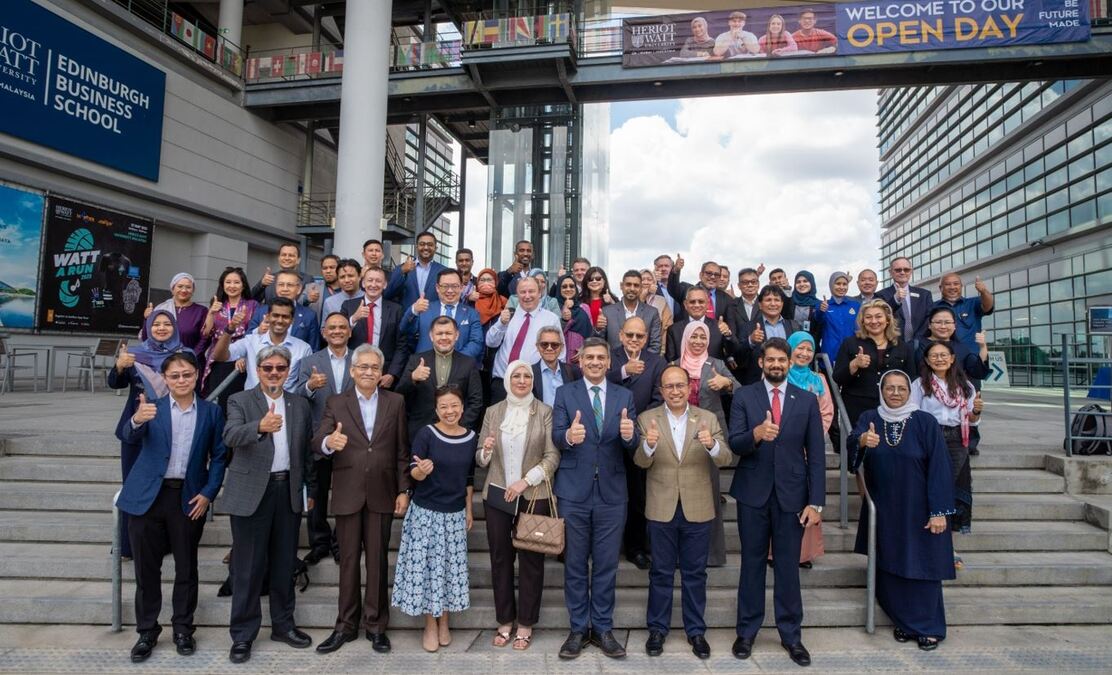Published:

Heriot-Watt University Malaysia (HWUM) hosted the Vice Chancellors' Council for Private Universities (VCCPU) and Education Malaysia Global Services (EMGS) roundtable discussion on the higher education landscape for international students on 6 June 2023.
The Malaysia Education Blueprint 2015-2025 (Higher Education) had set a target of 250,000 international students, with an aim to transition Malaysia into an international higher education hub by the year 2025.
The higher education institutions (HEIs) in Malaysia have established and conducted several initiatives to support this goal, especially after the pandemic, when all borders were opened, and the country continued to pursue its higher education aspiration.
In 2022, Malaysia received 51,270 international student applications for both public and private higher education institutions, witnessing year-over-year growth, an increase of 27.5 per cent.
In order to deliberate on this matter, HWUM hosted the roundtable discussion with relevant stakeholders which includes the Malaysian Ministry of Higher Education, the Malaysian Qualifications Agency (MQA), the Immigration Department of Malaysia, the High Commission of Pakistan, the Embassy of the Republic of Iraq in Kuala Lumpur, Tourism Malaysia, and several Malaysian public and private universities.
Professor Mushtak Al-Atabi, Chairman of VCCPU, who is also the Provost and Chief Executive Officer of HWUM, said, "We are hosting this roundtable here today with the intention of collaborating with all valuable stakeholders to ensure that we can meet the target of 250,000 international students by 2025. Towards this, we need to re-evaluate how Malaysia can best serve its role as the leading transnational education hub in Southeast Asia, and we must continue to draw in students from abroad to provide them with the high-quality education they need to advance their knowledge and skills for the benefit of society at large and the global economy.”
Novie Tajuddin, Chief Executive Officer of EMGS, said, "While we are catching up post-pandemic to welcome more international students to Malaysia, we are able to identify the top sending markets to Malaysia, which include China, Indonesia, Bangladesh, India, Nigeria, Pakistan, Japan, and Egypt. As a result, we will place more emphasis on these countries and continue to support the government's aspiration of attracting 250,000 international students by 2025 in order to position Malaysia as the international education hub of choice. VCCPU is a valued partner in this regard and working closely with its members is a key strand of our strategy."
Jazreel Goh, Director Malaysia of British Council, said, “Despite East Asia's declining share of the global transnational education enrolments, the regions hold great promise for United Kingdom (UK) higher education institutions. The region is ripe for new partnership opportunities, especially institutions looking at ‘deeper partnerships' beyond merely teaching transactions. Currently, East Asia remains home to four of the seven largest TNE locations in the world, no other region can rival East Asia's combination of size and high-quality local higher education provision, and this is a great opportunity for countries such as Malaysia. I commend the VCCPU for leading this initiative and we are happy to work with them closely to achieve our common objectives.”
The panel discussions recommended the following:
1. Policies and process
- A streamlined visa application process is needed for students and dependants (for postgraduate matured students); before, during and after the application process. Students' visas should be awarded for the duration of study of the programme, rather than on a yearly basis. Malaysia can also consider introducing a fast-track for students' visa application (for applicants who are interested in paying additional fees) like the case of UK.
- The country should have a post-study visa like the United Kingdom and Australia. This can be introduced to students from low-risk countries and/or for programmes where the talents are needed by the Malaysian economy. This will make the country more attractive to MNCs that are considering operating here.
- Facilitating the process of enrolment of expatriate staff in Malaysia in programmes offered by Malaysian institutions to leverage this untapped market.
- Allowing international students to study online at Malaysian universities without the need for students' visa. This is a growing market and other countries like Australia are tapping into it.
2. Internship and working opportunities while studying
- International students need to be allowed to do internships with firms in Malaysia to help them gain global experience and exposure.
- Furthermore, they should be allowed to work while studying in Malaysia to support themselves and contribute to the economy.
3. Branding and Marketing on Malaysia as a TNE hub
- Marketing and promoting transnational education in the region should also be a priority for Malaysia. This includes increasing awareness of the opportunities available such as Malaysia (PLUS) education programmes, where international students may use Malaysia as a bridge to study in other courtiers such as UK, Australia, or USA after completing part of their studies here.
- Additionally, the Malaysian government can continue to invest in developing strong relationships with other countries in the region. This is to ensure that Malaysia remains an attractive destination for transnational students.
- Leveraging Malaysia as a TNE education by promoting not only the cultural aspects of the country but also the rigour of the education and the depth of the economy (such as number of MNCs).
4. Accreditation
- Ensuring that the programmes offered in Malaysia are recognised worldwide. This can be done through concerted G2G work particularly for countries that send higher numbers of students to Malaysia.
5. Scholarships
- The government is encouraged to strategically use financial aid and scholarships of private universities to help international students access higher education, especially in countries where there is high demand such as Bangladesh, India, and Pakistan.